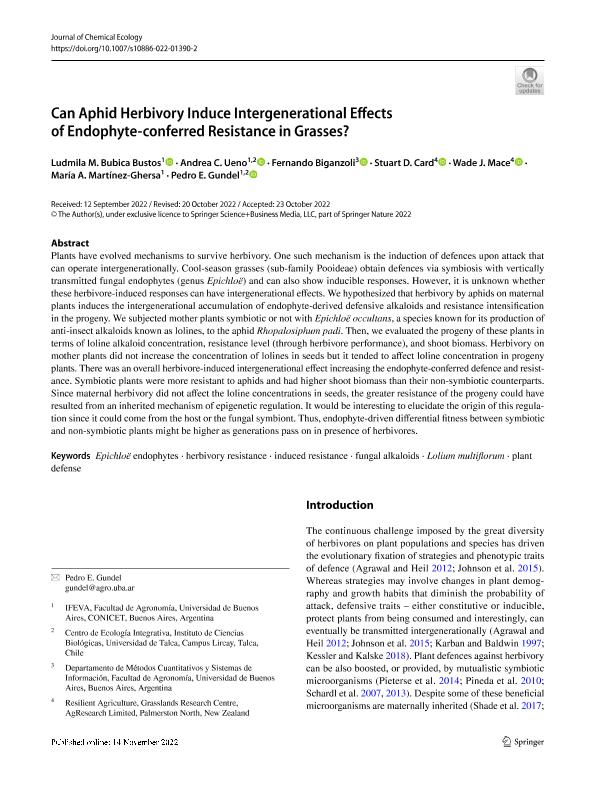Artículo
Can Aphid Herbivory Induce Intergenerational Effects of Endophyte-conferred Resistance in Grasses?
Bubica Bustos, Ludmila Micaela ; Ueno, Andrea Celeste
; Ueno, Andrea Celeste ; Biganzoli, Fernando
; Biganzoli, Fernando ; Card, Stuart D.; Mace, Wade J.; Martínez Ghersa, María A.; Gundel, Pedro Emilio
; Card, Stuart D.; Mace, Wade J.; Martínez Ghersa, María A.; Gundel, Pedro Emilio
 ; Ueno, Andrea Celeste
; Ueno, Andrea Celeste ; Biganzoli, Fernando
; Biganzoli, Fernando ; Card, Stuart D.; Mace, Wade J.; Martínez Ghersa, María A.; Gundel, Pedro Emilio
; Card, Stuart D.; Mace, Wade J.; Martínez Ghersa, María A.; Gundel, Pedro Emilio
Fecha de publicación:
12/2022
Editorial:
Springer
Revista:
Journal of Chemical Ecology
ISSN:
0098-0331
Idioma:
Inglés
Tipo de recurso:
Artículo publicado
Clasificación temática:
Resumen
Plants have evolved mechanisms to survive herbivory. One such mechanism is the induction of defences upon attack that can operate intergenerationally. Cool-season grasses (sub-family Pooideae) obtain defences via symbiosis with vertically transmitted fungal endophytes (genus Epichloë) and can also show inducible responses. However, it is unknown whether these herbivore-induced responses can have intergenerational effects. We hypothesized that herbivory by aphids on maternal plants induces the intergenerational accumulation of endophyte-derived defensive alkaloids and resistance intensification in the progeny. We subjected mother plants symbiotic or not with Epichloë occultans, a species known for its production of anti-insect alkaloids known as lolines, to the aphid Rhopalosiphum padi. Then, we evaluated the progeny of these plants in terms of loline alkaloid concentration, resistance level (through herbivore performance), and shoot biomass. Herbivory on mother plants did not increase the concentration of lolines in seeds but it tended to affect loline concentration in progeny plants. There was an overall herbivore-induced intergenerational effect increasing the endophyte-conferred defence and resistance. Symbiotic plants were more resistant to aphids and had higher shoot biomass than their non-symbiotic counterparts. Since maternal herbivory did not affect the loline concentrations in seeds, the greater resistance of the progeny could have resulted from an inherited mechanism of epigenetic regulation. It would be interesting to elucidate the origin of this regulation since it could come from the host or the fungal symbiont. Thus, endophyte-driven differential fitness between symbiotic and non-symbiotic plants might be higher as generations pass on in presence of herbivores.
Archivos asociados
Licencia
Identificadores
Colecciones
Articulos(IFEVA)
Articulos de INST.D/INV.FISIOLOGICAS Y ECO.VINCULADAS A L/AGRIC
Articulos de INST.D/INV.FISIOLOGICAS Y ECO.VINCULADAS A L/AGRIC
Citación
Bubica Bustos, Ludmila Micaela; Ueno, Andrea Celeste; Biganzoli, Fernando; Card, Stuart D.; Mace, Wade J.; et al.; Can Aphid Herbivory Induce Intergenerational Effects of Endophyte-conferred Resistance in Grasses?; Springer; Journal of Chemical Ecology; 48; 11-12; 12-2022; 867-881
Compartir
Altmétricas



